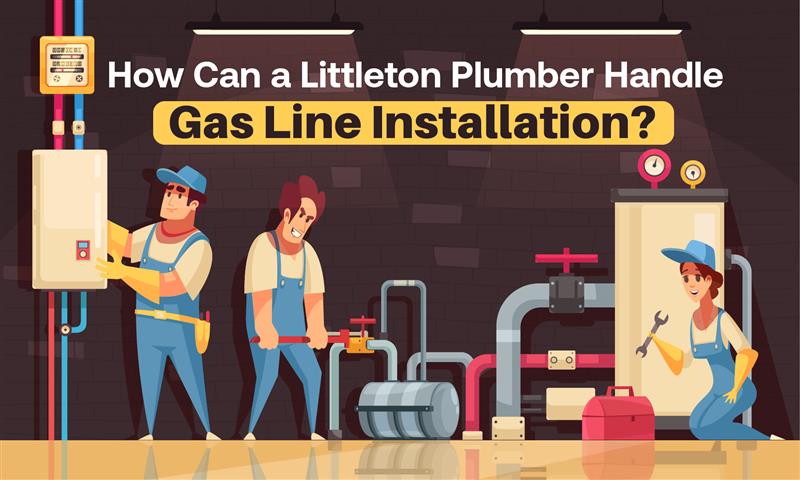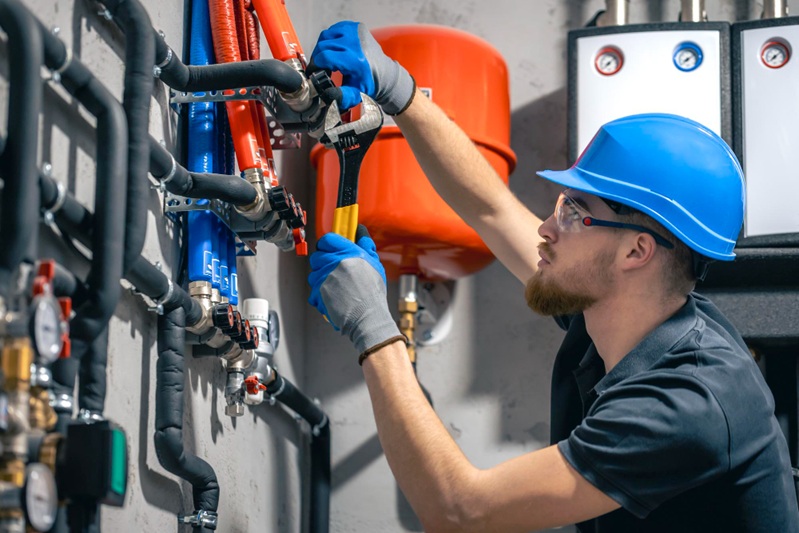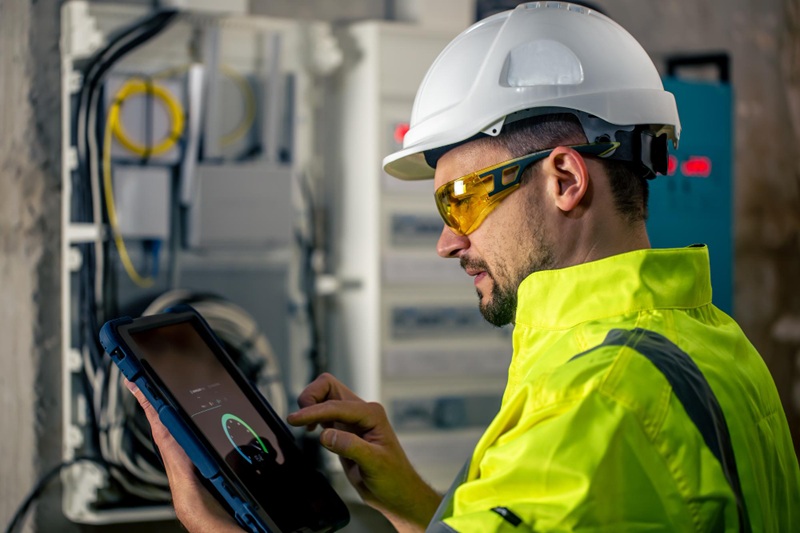
Gas line installation is a critical component for ensuring a safe and efficient home, yet it’s often overlooked by homeowners. Whether you’re installing new gas appliances or replacing outdated lines, it’s important to hire a professional plumber in Littleton. A properly installed gas line ensures smooth and safe operation, meeting all necessary standards and regulations. These lines carry natural gas to essential appliances and heating systems, and improper installation can result in dangerous gas leaks, fires, or even explosions. For a secure and reliable setup, working with an experienced plumber is key. A skilled plumber in Littleton ensures every installation prioritizes safety, compliance, and efficiency.
What Makes Gas Line Installation So Important?
Gas line installation requires precision and careful consideration. Unlike other plumbing tasks, gas lines pose significant risks if not installed correctly. The process involves routing natural gas from the main supply to various points in the home, including your kitchen, furnace, and water heater. If not handled properly, poor installation can lead to gas leaks, which are not only a fire hazard but also a serious health risk.
Gas lines are designed to be durable, but the installation process must adhere to strict codes and regulations. A plumber in Littleton with experience in gas line installation is well-versed in local regulations and knows exactly how to meet them. Whether you’re adding a gas-powered appliance or installing a new gas line, you must ensure that the job is done right the first time.
The Step-by-Step Process of Gas Line Installation
Gas line installation is a complex and highly regulated task that requires precision, expertise, and strict adherence to safety protocols. Below is an in-depth overview of the process a licensed plumber in Littleton follows to ensure a safe, efficient, and code-compliant gas line installation:
Initial Inspection and Planning
The first step in any gas line installation is a comprehensive site inspection. A professional plumber in Littleton will:
- Assess the existing plumbing and gas infrastructure to determine compatibility with new installations.
- Identify potential hazards such as proximity to electrical wiring, water lines, or structural obstacles.
- Plan the most efficient and safe gas line route, ensuring compliance with local building codes and NFPA (National Fire Protection Association) standards.
- Calculate the required pipe diameter and gas pressure rating based on the BTU (British Thermal Unit) demand of the connected appliances.
Obtaining Necessary Permits
Before starting the installation, a plumber in Littleton must secure the required permits from local authorities. This ensures the project adheres to:
- National and local safety codes, including the International Fuel Gas Code (IFGC) and Colorado-specific regulations for safe gas line installation.
- Inspection requirements, ensuring structural integrity, proper material usage, and compliance with gas line pressure ratings to prevent hazards.
- Homeowner Association (HOA) regulations, if applicable, to avoid potential conflicts and ensure compliance with community guidelines.
A licensed plumber in Littleton will handle all the necessary paperwork, coordinate with local building departments, and schedule both pre- and post-installation inspections to ensure the installation meets all legal and safety requirements.
Shutting Off the Gas Supply
Before any work begins, the main gas supply valve must be shut off to prevent leaks and exposure. The plumber will:
- Use a manometer to measure existing gas pressure before shutting down the system.
- Lock out the gas meter and place warning signs to prevent accidental reactivation.
- In cases of rerouting, install temporary shut-off valves to isolate sections of the pipeline.
- Depressurize the existing lines safely before cutting or removing old piping.
For commercial projects, additional precautions, such as ventilation of gas residuals and the use of non-sparking tools, may be required.
Running the Gas Lines
- Once the preparation is complete, a plumber in Littleton will begin the installation process by:
- Selecting the appropriate piping material, such as black iron, galvanized steel, copper, or CSST (Corrugated Stainless Steel Tubing), based on the specific requirements of the installation.
- Cutting, threading, and assembling pipe segments while ensuring air-tight, leak-proof joints to prevent gas leaks.
- Using Teflon tape or pipe joint compound on threaded connections to enhance seal integrity and prevent leaks over time.
- Installing properly sized shut-off valves at key points, allowing for safe maintenance access and emergency shut-offs when needed.
- Routing gas lines through walls, attics, crawlspaces, or underground trenches while ensuring they are protected from physical damage, corrosion, and temperature fluctuations to extend their lifespan.
- Implementing expansion loops or flexible connectors to accommodate thermal expansion and prevent stress fractures, ensuring a durable and long-lasting gas line system.
Our plumber in Littleton follows these critical steps to guarantee a safe, efficient, and code-compliant gas line installation.
Connection to Appliances
After the gas lines are securely in place, the plumber will:
- Install dedicated shut-off valves at each appliance location.
- Ensure proper venting and combustion air supply for appliances like water heaters and furnaces.
- Use flexible gas connectors or rigid piping to securely attach the gas lines to stoves, heaters, or fireplaces.
- Apply soapy water solutions or electronic gas sniffers to detect micro-leaks before fully pressurizing the system.
- Verify that appliance regulators are correctly adjusted to prevent over- or under-pressurization.
For high-demand appliances, such as tankless water heaters or industrial ovens, the plumber may need to install dedicated gas pressure regulators.
Inspection and Testing
Once the installation is complete, a plumber in Littleton will conduct rigorous testing to ensure the structural integrity and safety compliance of the gas line system:
-
Pressure Testing:
Use an air or nitrogen pressure test at 1.5 times the working pressure as required by NFPA (National Fire Protection Association) guidelines.
Monitor pressure readings using a digital pressure gauge for at least 15 minutes to several hours, depending on local building codes and system specifications.
-
Leak Detection:
To detect even the smallest leaks, a plumber in Littleton will use gas leak detectors, infrared imaging, or ultrasonic sensors to locate invisible leaks before the gas system is activated.
Perform a soap bubble test at all pipe joints and connection points to verify an air-tight, gas-tight seal.

-
Flow and Combustion Testing:
To ensure efficient operation and safety, a plumber in Littleton will ignite gas-powered appliances to check for proper flame behavior and burner efficiency.
Measure carbon monoxide (CO) levels using specialized combustion analyzers to ensure safe and complete combustion.
By following these critical testing procedures, a plumber in Littleton ensures that the gas line system is leak-free, fully operational, and compliant with all safety standards
Final Inspection and Approval
The final step in the process involves approval from local building inspectors:
A certified inspector will verify:
- Correct pipe sizing and material usage.
- Proper pressure test results and leak-free connections.
- Compliance with ventilation and combustion air requirements.
- If any corrections are needed, the plumber will adjust and request a follow-up inspection.
- Once approved, the gas supply is officially turned on, and the system is ready for use.
Only after passing all required inspections will the gas line be deemed safe and operational.
Why Should You Call a Professional Plumber in Littleton for Gas Line Installation?
While many homeowners might attempt DIY projects for minor plumbing fixes, gas line installation is not something you want to take on yourself. It requires specialized knowledge, skills, and tools. Here’s why you should trust a professional plumber in Littleton:
Compliance with Local Codes and Regulations:
Gas lines are regulated by local authorities to ensure the safety of all residents. A plumber in Littleton understands these codes and can help you navigate them. From materials used to the exact positioning of the lines, your plumber will make sure the installation is up to code and approved by the local building department.
Expertise in Handling Gas Lines Safely:
A plumber in Littleton who specializes in gas line installations is trained to handle gas safely. They are familiar with the risks associated with handling gas and know how to mitigate them. A simple mistake can cause severe consequences, but with an experienced professional, the process will be safe and efficient.

Accurate and Professional Installation:
Whether you are installing a gas stove, water heater, or outdoor grill, accurate installation is essential. A qualified plumber will ensure the gas lines are properly sized, routed, and sealed to prevent leaks. Additionally, the plumber will ensure the installation is functional and aesthetically pleasing.
Peace of Mind with a Warranty:
When you work with a licensed plumber in Littleton, the job typically comes with a warranty. This means that should anything go wrong, you’ll be covered. DIY installations or hiring unqualified contractors can leave you without recourse if a problem arises.
How a Littleton Plumber Ensures Safety During Gas Line Installation
Safety is the top priority when handling gas line installation. A plumber in Littleton uses a variety of techniques to ensure the safety of both the installation process and the residents of the home. These include:
- Leak Detection Tools: A plumber uses advanced, specialized equipment to accurately detect leaks both during and after installation. Common tools include electronic gas detectors, pressure gauges, and soap bubble tests, which help identify even the smallest leaks. Infrared cameras and ultrasonic detectors may also be used for more precise inspections. These tools ensure that no gas escapes from the system, preventing hazardous situations such as gas buildup, fire risks, or health concerns. Regular leak detection is a crucial step in maintaining the safety and efficiency of your gas line system.
- High-Quality Materials: Using top-grade materials is essential for preventing future issues and ensuring the durability of your gas line system. Professional plumbers in Littleton rely on high-quality, corrosion-resistant pipes (such as copper, steel, or flexible CSST tubing), along with premium fittings, valves, and seals that meet industry safety standards. These materials are designed to withstand pressure fluctuations, temperature changes, and environmental factors, reducing the risk of leaks or damage over time. By using superior materials, plumbers ensure a safer, longer lasting, and more efficient gas line installation for your home or business.
- Pressure Testing: After installation, the plumber conducts thorough pressure tests to ensure the gas lines are operating correctly and safely. This process involves pressurizing the system with air or an inert gas and using a pressure gauge to monitor for any drops that could indicate leaks. In some cases, soap bubble solutions or electronic leak detectors are also used for added precision. Pressure testing is a critical safety step that helps identify even the smallest leaks before the system is activated, preventing potential hazards such as gas leaks, fire risks, or carbon monoxide exposure. Only after passing these tests will the gas line be approved for use, ensuring a secure and efficient system.
- Emergency Services: If a gas leak or system malfunction occurs after installation, a 24/7 emergency plumber in Colorado can respond immediately to assess and resolve the issue. Gas leaks can be extremely hazardous, potentially leading to fire hazards, explosions, or carbon monoxide poisoning if left unaddressed. Emergency plumbers use advanced diagnostic tools such as gas detectors, thermal imaging cameras, and ultrasonic sensors to quickly pinpoint the source of the leak. Once identified, they follow strict safety protocols to shut off the gas supply, repair or replace damaged components, and perform a final pressure test to ensure the system is secure. A rapid response is crucial in preventing property damage and ensuring the safety of occupants.
FAQs About Gas Line Installation and Repair
- How do I know if my gas line needs replacement?
Signs include gas leaks, a rotten egg smell, rusted pipes, or malfunctioning appliances. Contact a plumber in Littleton immediately if you suspect a leak.
- How long does gas line installation take?
Gas line installation usually takes a few hours to a full day, depending on the job’s complexity. A plumber in Littleton can give you a more precise estimate.
- Is gas line installation expensive?
Costs vary, but hiring a reliable plumber ensures your gas line is installed safely, preventing future expensive repairs.
- Can I install a gas line myself?
No, gas line installation is dangerous and should only be done by a qualified plumber.
- What should I do if I smell gas?
Leave the area immediately, avoid sparks, and call a plumber in Littleton for emergency services.
Ensure Safe and Efficient Gas Line Installation with the Right Team
Don’t compromise when it comes to the safety and comfort of your home. If you’re searching for a reliable, professional plumber in Littleton, A Clear Choice Plumbing and Heating is the name you can trust. Our team of expert plumbers specializes in safe and efficient gas line installations. With numerous years of experience and a commitment to top-notch service, we will ensure your gas line installation is handled with the utmost care and attention to detail. Whether you need a new installation or an emergency repair, we available 24/7 to meet all your plumbing needs.
Choose A Clear Choice Plumbing and Heating for all your gas line installation needs. Call now to schedule an appointment with a professional plumber in Littleton and ensure your home remains safe and well-maintained.
